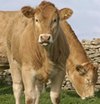Scottish livestock industry close to meltdown

Urgent prices rises are needed to avoid a meltdown of the Scottish livestock industry, the National Farmers Union of Scotland (NFUS) has announced.
Livestock producers have been driven into a loss-making situation, with a 100% rise in feed prices, recent floods and global pressures exerting upward pressure on production costs, NFUS president, Jim McLaren said.
“It is not an exaggeration to say the Scottish livestock industry is facing a meltdown unless the spiralling cost of rearing and taking care of livestock is reflected in prices.
“Supermarkets must understand that the same factors which have driven dairy farmers out of business are now hitting the whole livestock sector,” added Mr McLaren.
‘Pig and poultry sectors are staring into an abyss’
Pig and poultry producers have been particularly badly affected, with pig producers losing between £5 and £13 on every pig sold, while costs of producing a dozen eggs have risen by 12p.
“The pig and poultry sectors are staring into an abyss at present. This unprecedented rise in costs has led farmers to question their future and I believe it could spell an end of guaranteed supplies of Scottish meat and meat products on supermarket shelves.”
“That is obviously not what farmers want and, equally, it is not what consumers want. Supermarkets must now stand up to their warm words of local food production”
And price rises do not have to mean substantial price hikes at to the consumer, the union added.
“Even if the entire price rise farmers needed was passed on to consumers the impact would be relatively small. That is presuming supermarkets won’t cut their profit margin,” Mr McLaren said.
A 30p/kg rise for pig farmers would represent a rise of 13p on a pack of pork steaks or sausages, 10p on a pack of bacon and 4p on sliced ham.
For the beef sector, an increase in feed prices from £90/kg to £170/kg would require an extra 25p on a kg of prime beef to cover this increase alone.
Milling wheat price increases would add about 8p to the average price of a loaf, while the increase in price of malting barley would pass on 3p to a bottle of whisky.
